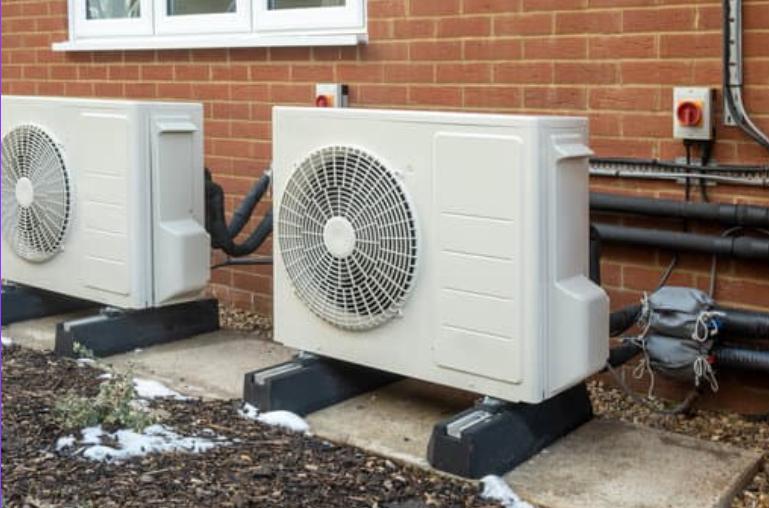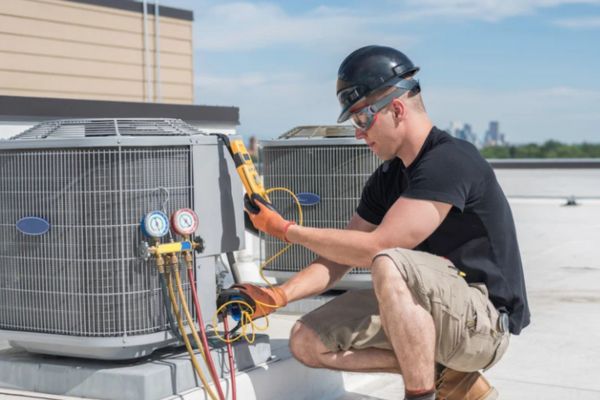When it comes to heating your home, choosing the right system can make a big difference in both comfort and energy costs. Two of the most common options are heat pumps and furnaces, each offering unique benefits depending on your needs and the climate where you live.
Whether you’re looking for energy efficiency, lower long-term costs, or consistent heat during cold winters, understanding the differences between these two systems will help you make the best decision for your home. Let’s see why.

What Is a Heat Pump?
A heat pump is a versatile system that can heat and cool your home. It’s unique because it transfers heat rather than generates it. Let’s take a closer look at how heat pumps work and their pros and cons.
A heat pump uses electricity to move heat between the indoors and outdoors. In winter, it extracts heat from the air or ground and pumps it inside, and in the summer, it reverses the process to cool your home. Heat pumps are highly energy-efficient, especially in milder climates, making them a cost-effective solution for year-round comfort. However, they may become less efficient in extremely cold temperatures, potentially leading to higher operating costs.
Pros:
- Energy-efficient, especially in milder climates.
- It can both heat and cool your home.
- Lower operational costs compared to traditional heating.
Cons:
- Higher upfront installation cost.
- Efficiency drops in very cold climates, sometimes requiring a backup heating system.
What Is a Furnace?
Furnaces are a traditional and reliable option for home heating, typically more efficient in colder regions. Furnaces generate heat by burning fuel and distributing it throughout the home. Let’s explore how they work and their advantages and drawbacks.
Furnaces burn fuel (natural gas, oil, or propane) to create heat, which is distributed through ducts. They are highly effective at maintaining warmth in colder climates and are designed to easily handle freezing temperatures. However, they do not provide cooling, so homeowners need a separate air conditioning system for the summer months.
Pros:
- Ideal for colder climates.
- Consistently heats homes even in freezing conditions.
- Lower upfront installation cost than heat pumps.
Cons:
- Higher fuel costs and energy consumption, especially in regions with expensive fuel prices.
- Requires a separate cooling system for the summer.
Cost Breakdown
Understanding the costs involved is key to choosing the right heating system. Both heat pumps and furnaces have upfront and operational expenses, but the differences can significantly affect your budget.
Initial Costs: Heat pumps typically have higher upfront costs due to the need for both heating and cooling capabilities. Installation can be more complex, which adds to the price. On the other hand, furniture usually costs less to install, though prices can vary depending on the fuel type.
Long-Term Costs: Heat pumps, while more expensive initially, tend to save money over time due to their energy efficiency, especially in milder climates. Furnaces, however, have higher fuel costs, particularly in areas with high gas or oil prices, and their long-term operational expenses can add up quickly.
Incentives: Some regions offer rebates or incentives for installing energy-efficient heat pumps, potentially lowering the total cost over time.
Below is a comparison of heat pumps and furnaces across key factors such as cost, maintenance, energy efficiency, and longevity to help you make an informed decision.
Climate Suitability
Where you live plays a significant role in determining which system is best for your home. Climate directly affects the efficiency and performance of both heat pumps and furnaces.
Heat Pumps: Heat pumps are best suited for milder climates, where winter temperatures rarely drop below freezing. They can operate efficiently in these areas and provide reliable heating and cooling.
Furnaces: In colder climates, furnaces are generally the better choice. They are designed to handle extreme cold and maintain consistent warmth, even in freezing temperatures. Homeowners in these areas may find heat pumps less effective and more costly to operate during winter.
Energy Efficiency and Environmental Impact
Energy efficiency is essential for reducing costs and minimizing environmental impact. Both systems offer varying levels of efficiency, depending on the climate and specific model.
Heat Pumps: Heat pumps are known for their high energy efficiency, as they transfer heat rather than generate it. This makes them a more environmentally friendly option, as they use less energy and produce fewer emissions, especially when paired with renewable energy sources like solar panels.
Furnaces: Modern furnaces are more efficient than older models, but they consume more energy than heat pumps. Furnaces that run on natural gas or oil have a higher carbon footprint, but high-efficiency models can help reduce environmental impact.
Making the Right Choice
Choosing between a heat pump and a furnace depends on various factors, including your climate, home size, and long-term budget. You can select a system that works best for your unique situation by weighing these considerations.
Here are a few things to consider when making your choice:
- Climate: A heat pump may be the best option for energy efficiency and year-round comfort if you live in a milder region. In colder climates, a furnace could be more reliable for consistent heating.
- Upfront Costs vs. Long-Term Savings: Heat pumps may cost more to install but can save you money in the long run due to their energy efficiency. Furnaces have a lower initial cost but can be more expensive to operate over time.
Consulting a professional HVAC technician can help you assess your home’s needs and make the right decision for your heating system.
Both heat pumps and furnaces offer distinct advantages, and the best choice for your home depends on your climate, budget, and energy efficiency goals. By understanding the differences between these systems, you can make a more informed decision that will keep your home comfortable and your energy bills manageable.


